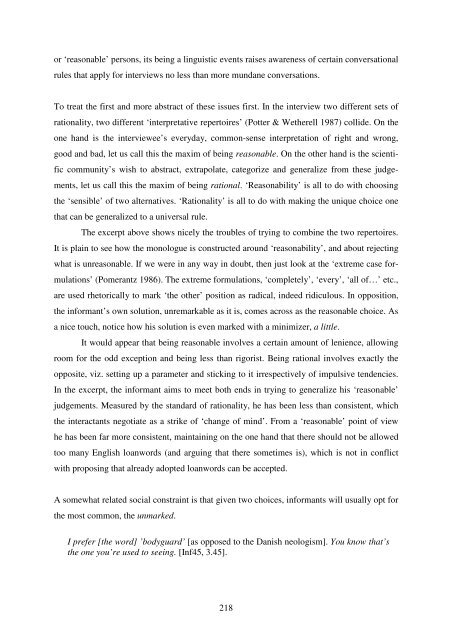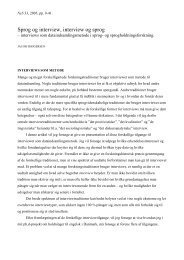Hør dog hvad de siger - Note-to-Self: Trials & Errors
Hør dog hvad de siger - Note-to-Self: Trials & Errors
Hør dog hvad de siger - Note-to-Self: Trials & Errors
Create successful ePaper yourself
Turn your PDF publications into a flip-book with our unique Google optimized e-Paper software.
or ‘reasonable’ persons, its being a linguistic events raises awareness of certain conversational<br />
rules that apply for interviews no less than more mundane conversations.<br />
To treat the first and more abstract of these issues first. In the interview two different sets of<br />
rationality, two different ‘interpretative reper<strong>to</strong>ires’ (Potter & Wetherell 1987) colli<strong>de</strong>. On the<br />
one hand is the interviewee’s everyday, common-sense interpretation of right and wrong,<br />
good and bad, let us call this the maxim of being reasonable. On the other hand is the scienti-<br />
fic community’s wish <strong>to</strong> abstract, extrapolate, categorize and generalize from these judge-<br />
ments, let us call this the maxim of being rational. ‘Reasonability’ is all <strong>to</strong> do with choosing<br />
the ‘sensible’ of two alternatives. ‘Rationality’ is all <strong>to</strong> do with making the unique choice one<br />
that can be generalized <strong>to</strong> a universal rule.<br />
The excerpt above shows nicely the troubles of trying <strong>to</strong> combine the two reper<strong>to</strong>ires.<br />
It is plain <strong>to</strong> see how the monologue is constructed around ‘reasonability’, and about rejecting<br />
what is unreasonable. If we were in any way in doubt, then just look at the ‘extreme case for-<br />
mulations’ (Pomerantz 1986). The extreme formulations, ‘completely’, ‘every’, ‘all of…’ etc.,<br />
are used rhe<strong>to</strong>rically <strong>to</strong> mark ‘the other’ position as radical, in<strong>de</strong>ed ridiculous. In opposition,<br />
the informant’s own solution, unremarkable as it is, comes across as the reasonable choice. As<br />
a nice <strong>to</strong>uch, notice how his solution is even marked with a minimizer, a little.<br />
It would appear that being reasonable involves a certain amount of lenience, allowing<br />
room for the odd exception and being less than rigorist. Being rational involves exactly the<br />
opposite, viz. setting up a parameter and sticking <strong>to</strong> it irrespectively of impulsive ten<strong>de</strong>ncies.<br />
In the excerpt, the informant aims <strong>to</strong> meet both ends in trying <strong>to</strong> generalize his ‘reasonable’<br />
judgements. Measured by the standard of rationality, he has been less than consistent, which<br />
the interactants negotiate as a strike of ‘change of mind’. From a ‘reasonable’ point of view<br />
he has been far more consistent, maintaining on the one hand that there should not be allowed<br />
<strong>to</strong>o many English loanwords (and arguing that there sometimes is), which is not in conflict<br />
with proposing that already adopted loanwords can be accepted.<br />
A somewhat related social constraint is that given two choices, informants will usually opt for<br />
the most common, the unmarked.<br />
I prefer [the word] ’bodyguard’ [as opposed <strong>to</strong> the Danish neologism]. You know that’s<br />
the one you’re used <strong>to</strong> seeing. [Inf45, 3.45].<br />
218



